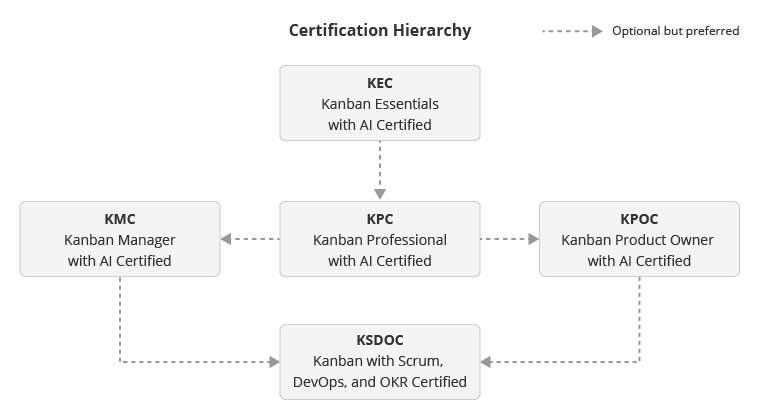Why get certified?
Kanban is one of the most effective frameworks for driving continuous improvement and operational efficiency in modern organizations. Kanbanstudy™’s certification program provides professionals with the knowledge and skills to effectively implement Kanban principles in practical, real-world situations.
Certification Hierarchy

Kanbanstudy™ certified professionals help organizations optimize workflow management, resulting in improved efficiency, faster delivery times, and increased ROI. They possess in-depth knowledge of Kanban principles and can proactively address challenges related to practical implementation.
Kanban Essentials Certified (KEC)

The Kanban Essentials Certified (KEC) course is designed for individuals and teams seeking to understand the foundational principles of Kanban and its application in workflow management. This certification provides a clear understanding of how Kanban enhances efficiency, reduces bottlenecks, and enables continuous delivery across various industries, including software development, manufacturing, and service-based environments.
Kanban with AI Certified (KAC)

Kanban with AI Certified (KAC™) course is designed to help professionals integrate Artificial Intelligence techniques into the Kanban framework - to drive smarter flow management, real-time decision support, predictive analytics, and continuous improvement. This program blends core Kanban principles with AI-powered practices, enabling teams and organizations to better manage work in progress, reduce bottlenecks, and make data-driven improvements.
Kanban Professional Certified (KPC)

The Kanban Professional with AI Certified (KPC) course is designed for professionals seeking in-depth knowledge of Kanban principles, roles, artifacts, and processes. This certification equips individuals with practical skills to implement and manage Kanban systems effectively, ensuring smooth workflow, enhanced collaboration, and continuous delivery.
Kanban Manager Certified (KMC)

The Kanban Manager with AI Certified (KMC) course is designed for professionals seeking to master the implementation of Kanban at an organizational level. This certification equips individuals with the expertise to lead Kanban teams, optimize workflow efficiency, leverage Kanban metrics, and align Kanban with strategic business objectives, such as OKRs (Objectives and Key Results).
Kanban Product Owner Certified (KPOC)

The Kanban Product Owner with AI Certified (KPOC) course is designed for Product Owners and other professionals seeking to understand how to manage and optimize the flow of work using Kanban in Agile environments. This certification provides a comprehensive understanding of Kanban principles, roles, artifacts, cadences, and processes, enabling individuals to effectively align product strategy with Kanban practices and enhance team collaboration and workflow efficiency.
Kanban with Scrum, DevOps, and OKRs Certified (KSDOC)

The Kanban with Scrum, DevOps, and OKRs Certified (KSDOC) course is designed for professionals looking to integrate Kanban with Scrum, DevOps, and OKRs to optimize workflow, delivery, and alignment with organizational objectives. This course provides a comprehensive understanding of how Kanban enhances product development in a hybrid Agile environment, enabling continuous delivery, improvement, and strategic alignment through OKRs.
Kanbanstudy Certified Coach (KCC)

The Kanbanstudy Certified Coach (KCC) program prepares Kanban practitioners to effectively manage and implement Kanban in complex projects involving large teams, programs, and portfolios. This certification also empowers professionals to lead multiple Kanban implementations and provide consultation across organizations.
Must be a Kanbanstudy Certified Trainer (KCT).

Kanban training for certification exams (such as KPC, KMC, KPOC, and KSDOC) is best conducted in classrooms or through virtual instructor-led sessions. Kanbanstudy™ faculty must be experts in the specific certification they teach and have a deep understanding of the KBOK™ Guide. Additionally, they should be skilled educators with strong soft skills to manage diverse classroom dynamics and ensure the delivery of high-quality training.
Other Popular Certifications
SCRUMstudy™, 6Sigmastudy™, BALearning™ and OKRstudy™ are global accreditation bodies offering certifications in Agile, Six Sigma, Buisness Analysis and Objectives and Key Results (OKRs), respectively. SCRUMstudy™ provides a structured approach to Scrum adoption with certifications like Scrum Master Certified (SMC®) and Scrum Product Owner Certified (SPOC®), helping organizations improve agility and project efficiency. 6Sigmastudy™ focuses on Six Sigma methodologies, offering certifications from Yellow Belt to Lean Black Belt to enhance process efficiency and quality. BALearning™ offers comprehensive training and certification in Business Analysis, equipping professionals with the skills to identify business needs and deliver effective solutions. These programs drive efficiency, strategic execution, and business growth. OKRstudy™ specializes in OKR certifications, guiding organizations in goal-setting and performance optimization using the OKR Body of Knowledge (OKRBOK™) Guide. These programs drive efficiency, strategic execution, and business growth.
